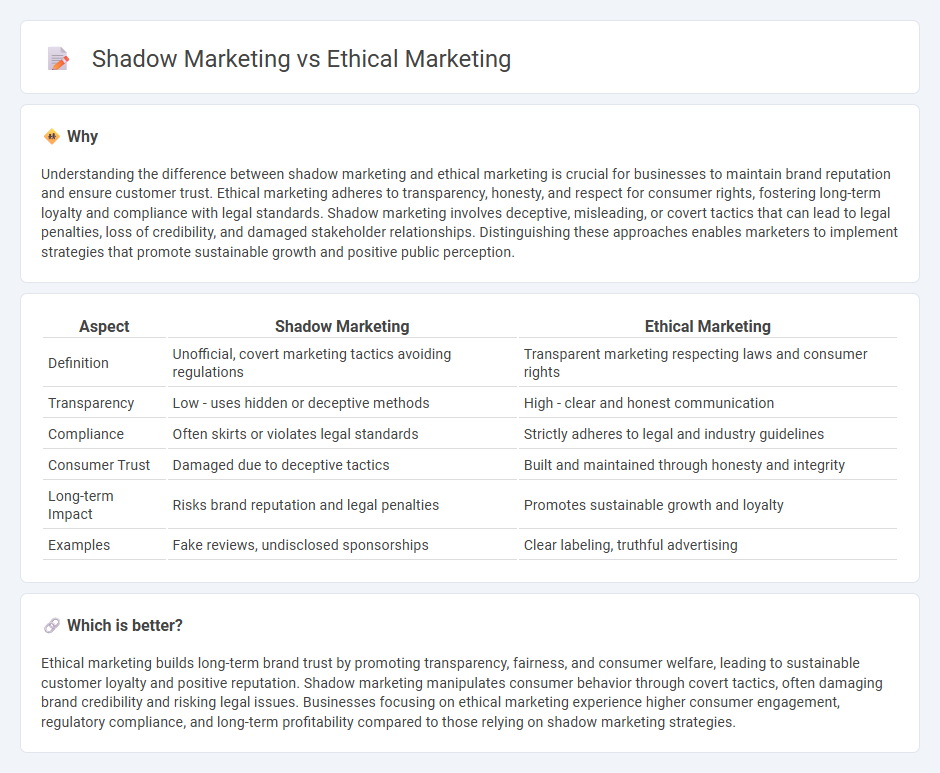
Shadow marketing involves covert strategies aimed at manipulating consumer behavior without transparency, often raising ethical concerns and risking brand reputation. Ethical marketing prioritizes honesty, fairness, and social responsibility, fostering long-term trust and sustainable customer relationships. Explore the key differences between shadow marketing and ethical marketing to understand their impact on brand integrity.
Why it is important
Understanding the difference between shadow marketing and ethical marketing is crucial for businesses to maintain brand reputation and ensure customer trust. Ethical marketing adheres to transparency, honesty, and respect for consumer rights, fostering long-term loyalty and compliance with legal standards. Shadow marketing involves deceptive, misleading, or covert tactics that can lead to legal penalties, loss of credibility, and damaged stakeholder relationships. Distinguishing these approaches enables marketers to implement strategies that promote sustainable growth and positive public perception.
Comparison Table
| Aspect | Shadow Marketing | Ethical Marketing |
|---|---|---|
| Definition | Unofficial, covert marketing tactics avoiding regulations | Transparent marketing respecting laws and consumer rights |
| Transparency | Low - uses hidden or deceptive methods | High - clear and honest communication |
| Compliance | Often skirts or violates legal standards | Strictly adheres to legal and industry guidelines |
| Consumer Trust | Damaged due to deceptive tactics | Built and maintained through honesty and integrity |
| Long-term Impact | Risks brand reputation and legal penalties | Promotes sustainable growth and loyalty |
| Examples | Fake reviews, undisclosed sponsorships | Clear labeling, truthful advertising |
Which is better?
Ethical marketing builds long-term brand trust by promoting transparency, fairness, and consumer welfare, leading to sustainable customer loyalty and positive reputation. Shadow marketing manipulates consumer behavior through covert tactics, often damaging brand credibility and risking legal issues. Businesses focusing on ethical marketing experience higher consumer engagement, regulatory compliance, and long-term profitability compared to those relying on shadow marketing strategies.
Connection
Shadow marketing involves covert or deceptive promotional tactics that obscure the true intentions behind a campaign, while ethical marketing emphasizes transparency, honesty, and respect for consumer rights. Both concepts intersect in the marketing landscape as ethical frameworks seek to identify and eliminate shadow marketing practices to build trust and maintain brand integrity. Organizations adopting ethical marketing principles actively monitor and regulate marketing content to prevent manipulation and misinformation inherent in shadow marketing.
Key Terms
Transparency
Ethical marketing emphasizes transparency by clearly communicating product benefits, sourcing, and business practices to build trust with consumers, while shadow marketing often relies on covert tactics that obscure intentions and manipulate audience perceptions. Transparency in ethical marketing leads to long-term customer loyalty and brand integrity, contrasting sharply with the deceptive strategies of shadow marketing that risk reputational damage. Explore deeper insights on how transparency shapes consumer trust and marketing effectiveness.
Consumer trust
Ethical marketing prioritizes transparency, honesty, and respect for consumer rights, fostering long-term consumer trust and brand loyalty. Shadow marketing involves deceptive tactics, misinformation, and covert strategies that erode trust and damage brand reputation. Discover more about how maintaining ethical standards can strengthen consumer relationships and drive sustainable business growth.
Manipulation
Ethical marketing prioritizes transparency and respects consumer autonomy by promoting products and services honestly, whereas shadow marketing uses deceptive tactics to manipulate consumer behavior covertly. Manipulation in shadow marketing often involves exploiting psychological triggers without clear disclosure, undermining trust and informed decision-making. Explore detailed strategies and impacts of both approaches to understand their influence on consumer perceptions and business integrity.
Source and External Links
Ethical Marketing: 7 Campaigns & Best Practices in Action - Ethical marketing promotes products in ways that positively impact society and business, guided by principles like empathy, fairness, responsibility, transparency, and fostering a positive company culture to build trust and loyalty.
Ethical Marketing Explained: 4 Principles of Ethical Marketing - Ethical marketing is a strategy where companies commit to honesty, transparency, fairness, and responsibility in their marketing practices, communicating these values to attract like-minded customers while avoiding deceptive or exploitative tactics.
Ethical Marketing in Action: 11 Brilliant Examples - Ethical marketing is rooted in putting people above profits and is driven by principles such as empathy, honesty, sustainability, transparency, and keeping promises, with leadership adoption of these ethics being crucial for authentic campaigns.
 dowidth.com
dowidth.com